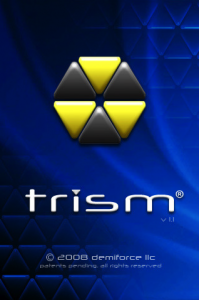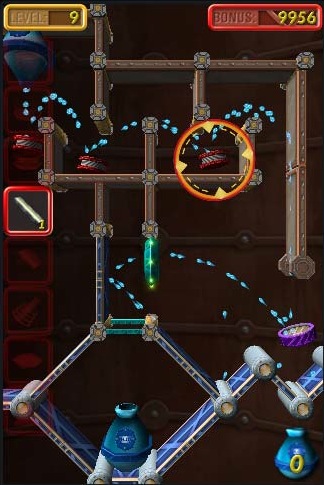Part 1: The explosive growth of the iTunes App Store
Part 3: The iTunes App Store Bannings and Rejections
The iTunes App Store was revolutionary in that it made it possible for independent developers to compete on the same playing field as big time publishers. The idea that any developer with a good idea could showcase a product to millions of potential customers with no significant barrier to entry has forever changed the way people develop mobile software. While big name developers like EA have undoubtedly had their fair share of success with the app store, it’s been the small-time developers, and often individuals, who have charmed the public with stories of iPhone success, and garnered national media attention in the process.
Here, in Part II of our iTunes App Store retrospective, we take a sequential look at some of the smaller developers who were able to strike it rich with the app store.
The Successful App Store Developers
Trism
 The first App Store success story belonged to Steve Demeter, the developer behind the popular puzzle game Trism. Early this fall, and just 2 months after the debut of the iTunes App Store, Demeter noted that Trism had netted him over $250,000 in profits. What made Demeter’s story so compelling, and unusual at the time, was that he coded the game entirely by himself over the course of 4 months, while still maintaining his day job as an ATM software designer. Demeter comically noted that a buddy of his came up with the name ‘Trism’, and that he subsequently paid him a few grand for his marketing efforts. Demeter subsequently quit his day job to launch a new company, called Demiforce, to focus exclusively on iPhone development.
The first App Store success story belonged to Steve Demeter, the developer behind the popular puzzle game Trism. Early this fall, and just 2 months after the debut of the iTunes App Store, Demeter noted that Trism had netted him over $250,000 in profits. What made Demeter’s story so compelling, and unusual at the time, was that he coded the game entirely by himself over the course of 4 months, while still maintaining his day job as an ATM software designer. Demeter comically noted that a buddy of his came up with the name ‘Trism’, and that he subsequently paid him a few grand for his marketing efforts. Demeter subsequently quit his day job to launch a new company, called Demiforce, to focus exclusively on iPhone development.
The success of Trism opened up everybody’s eyes to the potential of the iTunes App Store as a business. 250 grand isn’t chump change, and Trism’s impressive profits served to highlight that that you didn’t need a team of professional developers working with corporate funding in order to succeed on the iTunes App Store.
iFart Mobile
 While Apple’s app store acceptance policies are still far from perfect, it wasn’t too long ago that Apple policed the app store with puritanical authority. No farting apps, no drinking apps, and basically no fun apps were allowed. Luckily, Apple soon came to its senses, and once that happened, in came the farting and vomit apps by the dozens.
While Apple’s app store acceptance policies are still far from perfect, it wasn’t too long ago that Apple policed the app store with puritanical authority. No farting apps, no drinking apps, and basically no fun apps were allowed. Luckily, Apple soon came to its senses, and once that happened, in came the farting and vomit apps by the dozens.
But one app in particular proved to more successful than most, and that was iFart. iFart, as the name suggests, is a $.99 novelty iPhone app that plays a wide variety of fart sounds. It was initially released in mid December and over a 2 week period it earned over $80,000 in profits. Even more impressive is that over a 2 day period covering Christmas Eve and Christmas Day, iFart famously made over $40,000 in profits with over 58,000 people purchasing a copy.
iSteam
In mid-January, a couple of 22 year olds announced that they had already made over $100,00 with their iPhone app called iSteam. iSteam is a program that makes it appear that you have a layer of steam on your iPhone. Users can then wipe their fingers across the screen to write messages, and/or reveal what’s on the screen, mimicking an actual steamed up bathroom mirror. The developers of iSteam payed a lot of attention to the UI and included nice touches such as realistic sound effects when “writing” messages, and also, if you turn your iPhone upside down, droplets begin to slowly move downward. Now that’s real, baby!
iShoot
Just one month later came the impressive story of iShoot. iShoot is an iPhone artillery game developed by Ethan Nicholas, who subsequently quit his job as an engineer at Sun after his app raked netted over $600,000 in just one month. In an interview at the time, Nicholas stated, “I’m not going to be to be a millionaire in the next month, but I’d be shocked if it didn’t happen at the end of the year.”
The success of iShoot was significant because it was the first app to successfully use the strategy of offering a “lite” version in order to generate a lot of download volume, which in turn directed fans of the game to the then $3 paid full version of the game.
As with Trism, the success of iShoot highlighted just how much money individual programmers could potentially earn with a hit application. And in a somewhat motivational twist, Nicholas noted that prior to developing iShoot, he had never coded in Objective-C before.
Enigmo/Cro Mag Rally
 One of the more impressive, though less heralded, app store success stories has been that of Pangea Software, the development house behind popular iPhone games like Cro Mag Rally and the physics based 3D puzzle game Enigmo. At the SXSW conference last March, Pangea founder Brian Greenstone explained that his company’s iPhone apps have been selling so well that they will no longer develop applications for the Mac, and will instead focus their efforts solely on iPhone and iPod Touch development – a pretty powerful statement coming from a company that’s been developing Apple software for over 2 decades.
One of the more impressive, though less heralded, app store success stories has been that of Pangea Software, the development house behind popular iPhone games like Cro Mag Rally and the physics based 3D puzzle game Enigmo. At the SXSW conference last March, Pangea founder Brian Greenstone explained that his company’s iPhone apps have been selling so well that they will no longer develop applications for the Mac, and will instead focus their efforts solely on iPhone and iPod Touch development – a pretty powerful statement coming from a company that’s been developing Apple software for over 2 decades.
“There’s basically no point in going back to the Mac“, said Greenstone, “the iPhone is a more entertaining platform to develop for, and it makes 50 times as much money as the Mac.”
Enigmo in particular has proven to be quite the cash cow for Pangea, and as of last March, it had already generated over $1.5 million in revenue with over 800,000 paid downloads. That averages out to over $185,000 a month, and that’s after Apple takes its 30% cut.
Looking Forward
Since the iTunes App Store first debuted, the number of available applications has skyrocketed from 500 to over 60,000. With each passing month, it obviously becomes more of a challenge for a particular app to get noticed in the midst of literally thousands of other applications. Because of this, many have proclaimed that the iTunes App Store is too bloated for its own good. But while there is an undeniable amount of crapware in the app store, there are well over 40 million iPhone and iPod Touch users out there, and as a developer, those numbers are impossible to ignore, especially when iPhone and iPod Touch owners download more applications, on average, than users of any other smartphone.
Over the past 12 months, a large number of apps have generated an insane amount of money. From Pocket God to Flick Fishing, many apps have generated millions of dollars in profits. But the apps listed above were chosen because they, for the most part, represent what’s possible with the app store from the vantage point of an individual. EA will probably make a boatload of money selling SIMS for the iPhone, but it’s the developers like Ethan Nicholas and Steve Demeter that inspire the masses to take a serious look into what coding for the iPhone is all about.







Wed, Jul 8, 2009
Analysis, Featured, News